C.A.A. Savastano's Blog, page 11
January 20, 2019
JFK Assassination Myths 15

Presenting The Ochelli Effect's "JFK Myths 15" an expanding series dedicated to the examination of claims and evidence related to the assassination of President Kennedy. This latest episode concerns the allegation related to Malcolm Wallace, Beverly Oliver, and Richard Case Nagell. Evidence and assessment is provided by Professor Joan Mellen, author Carmine Savastano, with researchers Fred James and Steve Roe.
January 9, 2019
Evidence and the Big Easy III

A View From the French Quarter’s Bourbon Street during the average Louisiana day in New Orleans Circa 1965
Upstanding citizens, thugs, killers, con artists, and vagrants populated the seediest areas of the Big Easy. Amid this patchwork of aspiration and desperation, a rumbling in New Orleans began surrounding Jim Garrison's investigation of President Kennedy's death. The New Orleans District Attorney faced several challenges because amid the corridors of power in United States several officials the Kennedy case was closed. Yet Garrison was committed to revealing a plot he believed might include several officials, Cuban exiles, and local figures. Unfortunately, some in the public attempted to malign and obstruct him but this remains overlooked to embrace their other assertions. Yet the legal value of a witness is equal to the consistency of their statements.
One attempt of officials to marginalize Garrison was gathering older press information to learn useful negative information using the Central Intelligence Agency's Domestic Contacts Service. A letter regarding the effort by Agency Legislative Counsel John S. Warner requested background information on Garrison and suggested, "it would be a good idea for the New Orleans officer to get in touch with Congressman F. Edward Herbert when the latter was in New Orleans. Warner said Herbert was friendly and well disposed toward the Agency and could be useful. Herbert and Garrison were friends. They went to the same school and Herbert would have considerable information on Garrison."i Officials were leery of alerting Herbert about their interest in Garrison and sought make it a "casual and spontaneous gab session." Clearly, officials were ready to curb Garrison's efforts by any means possible including clandestinely using his friends against him.
Yet Garrison did not just have to contend with a series of official interference and plots to prevent his inquiry, he faced those seeking to destroy his case from within. One such instance was private investigator Gordon Novel who claimed to be a former CIA agent that Garrison reportedly called "a major witness in the Kennedy assassination plot investigation." Unfortunately, Novel could prove none of the grand claims of insider knowledge or employment with the Central Intelligence Agency. However, Garrison subsequently tied Novel to a Louisiana armed forces bunker robbery with other later suspects in his investigation and eventually a warrant for Novel's arrest was issued during the spring of nineteen sixty-seven.
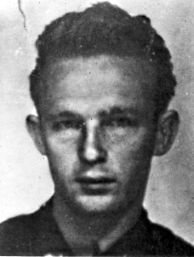
Electronics Expert Gordon Novel
Novel responded to Garrison's allegations with several of his own, he first called the Federal Bureau of Investigation to slander Garrison using the deceased former witness and suspect David Ferrie. Novel asserted he "believes District Attorney James Garrison is directly responsible for the death of David Ferrie." He told the FBI he and Garrison had previously discussed methods to "abduct Ferrie and that Garrison was very interested when Novel suggested the possibility of hitting Ferrie at the base of his skull with a rubber hammer for the purpose of abducting Ferrie". He added personally observing Garrison leave David Ferrie's apartment the morning Ferrie's corpse would be discovered and thus suggested the District Attorney was a murderer. Subsequently, Novel phoned the Times-Picayune newspaper to inform them "Mr. Garrison has finally fallen in the last trap" and then filed a fifty million dollar lawsuit targeting Garrison and his financial supporters.ii A CIA report additionally states Novel claimed on major radio stations that Garrison engaged in "occasional homosexuality", another seeming attempt to link the married Garrison to David Ferrie and damage his reputation.iii These claims similar to his prior statements have no evidence to support them, Ferrie's death would
not aid Garrison's case, and Novel's motivation was likely not offering reliable information but seeking
money, attention, and revenge.iv
Another figure later associated with the Garrison case in the role of possible suspect was Eugene Hale Brading aka Jim Braden.
He was a man with an extensive criminal record, alleged Mafia ties, sought to associate with the family of Nelson Bunker Hunt for alleged financial dealings, and was present in Dallas near the site of the assassination around the period it occurred. These facts inspired Garrison to suspect Brading and author Peter Noyes subsequently alleged Brading's connection with an unfolding conspiracy, yet additional evidence challenges such prior ideas because of a more extensive review conducted by the House Select Committee on Assassinations and other corroborating facts.
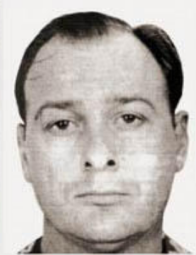
Eugene Hale Brading akA J. Braden
Brading informed officials of having no contact with Lee Harvey Oswald or Jack Ruby and despite his intention to meet with a member of the Hunt family; he was reportedly unable to locate them in a local office. Brading stated never observing Bunker Hunt and Oswald together, never discussing a plot to kill the President, and Brading had a legitimate reason to meet with Hunt to discuss the oil producing gas well property he owned in Louisiana that was developed with Roger Bauman and Morgan Brown of Dallas.
Following a polygraph and interrogation, officials interviewed Brading concerning his specific actions during November 22, 1963. He was reported to probation officer Roger Carroll at the Federal Building roughly twelve blocks from Dealey Plaza "at about noon time on both November 21 and 22, 1963" and this "business with Carroll took approximately 15 minutes."v vi Probation officer Roger Carroll believed that his meeting with Brading occurred "shortly before the assassination." This meeting and the later required travel to the Dal-Tex Building precludes significant time from the period some claim Brading undertook nefarious actions. Additionally, with just minutes left he would need to rush to the roof of the building, ready the weapon, prepare a firing position, and escape to the lower floors all while remaining unobserved.
Brading asserted he came into the Dal-Tex building to report the President's death in a phone call to his family but due to an elevator attendant's suspicions was reported to Dallas police and taken into custody. While some reasonably doubt his explanation for being present due to his criminal past, the running unseen assassin scenario is quite unlikely. Brading's location and publicly known activities in the aftermath of President Kennedy's death appear sinister but he was released a few hours later because no substantial evidence connected him to the crime. He does not have much time for any role in a plot and unless facts verify direct links to Brading complicity, no reason exists to assume his involvement.
A final strange figure related to the Garrison investigation is Richard Case Nagell, a former military intelligence officer that suffered mental and emotional damage from a plane crash. His life worsened as domestic and financial problems coupled with greater mental instability led him acts of outrageous and threatening behavior. Varying claims associated with him are reliant upon a single bank robbery in which some have asserted that Nagell had possible insider knowledge of the Kennedy plot and staged the robbery to protect him from danger. Later accounts offered a dramatic story of firing two shots in the bank then calmly walking outside to his car to await his eventual arrest. Conversely, Nagell did not mention any connection to the assassination until long after being jailed and previously refused to offer an explanation in court. Additionally, based upon evidence from the El Paso police he did not fire shots, walk to his car, and calmly await the police but tried to escape and surrendered a distance from the bank.
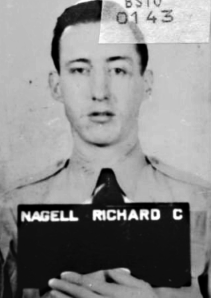
Asserted Witness Richard C. Nagell
Unknown to many was the presence of police officer J. Bundren assigned to guard the Treasury Department currency display in the west lobby and this might have been the among the targets attracting Nagell. Following the sound of shots in the east lobby, the officer rushed to the area where he learned Nagell had fled running out the side door. Eyewitnesses Hamilton Collins and Patsy Gordon observed Nagell flee the bank and John Grisom located outside watched Nagell run down the street toward his escape vehicle. The police officer "ran out the door of the bank chasing the subject to the corner of Oregon and Overland and then west on Overland" and Nagell's trail led to a local alleyway where he emerged in a vehicle but now faced the pursuing officer pointing a gun at him and stated "All-right, I give up."vii
After some questioning Nagell was taken into custody, his vehicle was impounded, and he seemingly later created mythical associations to the Kennedy assassination. Unfortunately, some would embrace his claims due to his military intelligence background, unstable mindset, and other schemes but this has proved to be a misleading distraction. During an altercation with the police, Nagell stated "You punk cop...If I ever get to the chance to 'hit' you I will" he made the threat shortly before the FBI interviewed him for violating federal laws.viii
Officials and unreliable claims that have consumed decades of attention still fuel aspersions upon Jim Garrison by his critics. Yet the actual circumstances of the matter challenge the nature of these claims and render some merely peripheral figures of interest that have delayed greater insights with pleasing illusions and lead us no closer to imperative knowledge. Allegations without substantial evidence do not allow us to perceive the true face of our veiled history and progress requires a path constructed with unyielding facts. Sincerely,
C. A. A. Savastano
References:
i. House Select Committee on Assassination, Segregated Central Intelligence Agency file, Microfilm Reel 24, Folder H, Photo surveillance, Garrison, May 10, 1967, National Archives and Records Administration Identification Number: 1994.04.12.12.14.44.280005
ii. HSCA, Seg. CIA file, Microfilm Reel 24, Folder I, Garrison Investigation, Garrison and the Kennedy Assassination, June 20, 1967, NARA ID: 1994.04.12.12.14.43.220005
iii. Miscellaneous CIA Series, File on Garrison, James, Garrison and the Kennedy Assassination: Gordon Dwane (sic) Novel, October 28, 1968, p. 7, NARA ID: 104-10304-10002
iv. HSCA, Seg. CIA file, Microfilm Reel 24, Folder H, Garrison Investigation, "Novel Asks Damages Which may total $50 Million", May 25, 1967, NARA: 1994.04.12.12.14.44.280005
v. HSCA, Administration Folder N-2, R#6330, AAG Michael M. Uhlmann's Correspondence to the SSC-I, Interview of Eugene Hale Brading, January 19, 1977, p. 5
vi. HSCA, Admin. Folder M6, Assassination Matters Volume XII, Letter to Roger Carroll from the Tattler, March 5, 1976, NARA ID: 124-10370-10012
vii. El Paso Police Department Supplementary Offense Report, Attempted Robbery of State National Bank, Ref: Richard Case Nagell, September 21, 1963
viii. El Paso Police Department Supplementary Offense Report, Vagrancy-Armed Robbery, Ref: Richard Case Nagell, September 20, 1963
Related Articles:
Disturbed Men
Related Podcasts:
The Man who claimed Too Much
Trouble in New Orleans
December 10, 2018
Consolidated CIA Files Update

Six new evidentiary files are offered on notable CIA figures including Ross Crozier, Henry Lopez, and Jacques Richardson. Additionally provided are two new summaries with photographs for Deputy IG Scott Breckenridge and Emilio A. Rodriguez.
November 23, 2018
The Ochelli Effect w/ JFK and RFK case updates
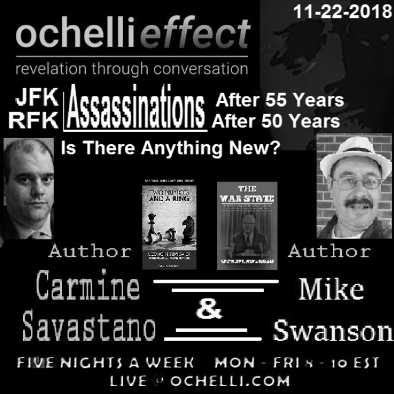
Author Carmine Savastano and historian Mike Swanson join your host Chuck Ochelli to discuss information and evidence dispelling some claims about one figure some have called a possible JFK assassination mastermind. The second hour reveals new research and substantial evidence that Los Angeles officials ignored a second person related to Sirhan Sirhan's actions that was required for the crime to occur.
November 16, 2018
JFK Lancer 2018 NID RFK Research and Evidence
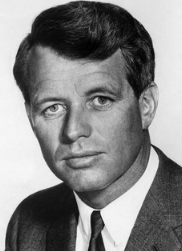
Evidence and research summaries for three notable people in the assassination case Senator Robert F. Kennedy reviewed at the JFK Lancer 2018 NID Conference by C.A.A. Savastano is offered and new connections and leads are established with primary evidence. Enjoy our new RFK assassination Related Individuals of Note section and a fresh related interview with The Past American Century podcast.
November 9, 2018
Our Thanks to JFK Facts
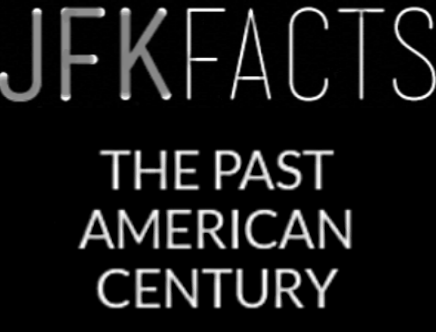
We appreciate Jefferson Morley and everyone at JFK Facts for their coverage of a recent episode of The Past American Century podcast. It features Chuck Ochelli and C.A.A. Savastano discussing the enduring relevance of political assassination and divisive politics.
November 2, 2018
Two New Interviews w/ C.A.A. Savastano
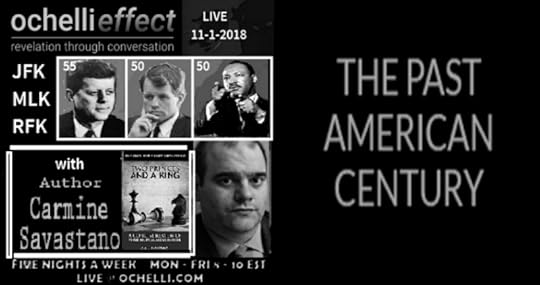
C.A.A. Savastano returns to the Ochelli Effect and The Past American Century Podcast to discuss political assassinations, his upcoming related speech in Dallas, and the CIA's "A Study of Assassination".
October 26, 2018
The Khashoggi Murder
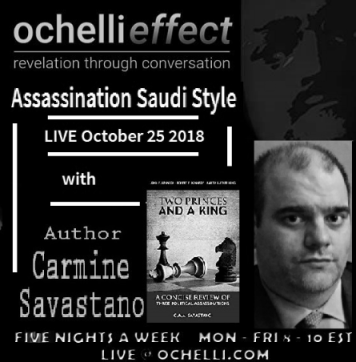
C.A.A. Savastano returns to the Ochelli Effect to assess the morphing narratives and public reports connected to the assassination of journalist and reform advocate Jamal Khashoggi.
October 11, 2018
Three New Interviews w/ C.A.A. Savastano on History and Intelligence Operations

Three new interviews with author C.A.A. Savastano on a wide range of intelligence figures and those connected to political assassination cases.
Midnight Writer News: C.A.A. Savastano returns to discuss five notable figures in the JFK case with your host S.T. Patrick. Tune in to hear the tangled, nefarious, and unlikely allegations that surround certain figures in the case.
The Ochelli Effect: Join Mike Swanson, C.A.A. Savastano, and your host Chuck Ochelli to discuss the life and influence of a largely unknown CIA operator during the Cold War named Leo Cherne. #US #CIA #Cherne #ColdWar
The Past American Century: A discussion about evidence and one long asserted myth related to the JFK case with author Carmine Savastano and historian Mike Swanson. #JFK #evidence #PAC
October 5, 2018
Cold War Business
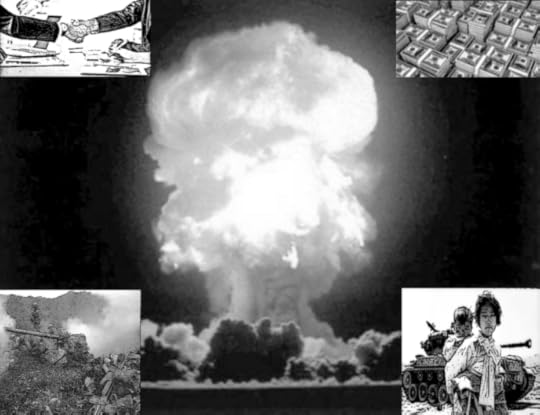
Few periods of history enjoyed the economic growth and prosperity generated by the fear and mistrust of the Cold War. The aftermath of the Second World War left political alliances frayed and the ambitious governments of Russia and the United States taking diametrically opposite social positions. Previous World War II funding and materials supplied by the United States to Russia was redistributed to set up democratic bulwarks in Western Europe. Stalin and the Communist Soviet regime annexed roughly half of Europe while a deep freeze settled over world policy and these two superpowers drew lines across the world.
The Cato Institute reports between 1948 and 1986 the United States alone spent over six trillion dollars on military spending with the inclusion of every Cold War engagement.i This includes but is not limited to the reinforcement of Europe, Cambodian and Laotian operations, the Cuban Missile Crisis, the Korean and Vietnam wars, vast troop and material costs, and our nuclear stockpile. According to the study, official groups usually assumed over two thirds of business costs in military spending and the private business paid the remainder. Such lucrative contractual arrangements in the proper circumstance would be a windfall to the right person and might offer a later path to influencing policy making. That person might prove quite useful for gathering intelligence, spreading propaganda, and providing advice to interested officials.
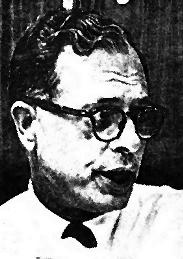
Official Adviser Leo Max Cherne
Leo Max Cherne was born to poor Russian immigrants on September 8, 1912 in the Bronx. Educated as a youth in New York City, Leo subsequently attended New York University and New York Law School by the early nineteen thirties. Following his education and employment in multiple legal practices, he collaborated with a sales representative and published a book recounting Cherne's financial advice. After a profitable release, the two men expanded their company to become the Research Institute of America and expanded Cherne's public advice to a greater audience with public speaking engagements. Cherne's success drew the notice of United States officials due to his staunchly pro-American and anti-Soviet beliefs. He was instrumental for using business practices to adapt industrial and military cooperation and General Douglas MacArthur utilized Cherne during the post-war reconstruction of Japan's economy. Cherne was a self-styled cold warrior but he publicly supported civil rights and criticized Joseph McCarthy's unethical tactics in fighting the Communist threat.
He became chairperson of the financially troubled International Rescue Committee in 1951 and soon his fundraising saved and propelled the expansion of the charity organization. By 1956, Cherne observed the Soviet repression of revolting Hungarians and reported his experience on the nationally syndicated Ed Sullivan program. This raised a substantial amount of money for support to refugees and provided greater national publicity to Cherne's multiple endeavors.ii The IRC still exists today and from Cherne's work has reportedly aided hundreds of thousands of people during his tenure and his many journeys to far off places to ease refugee suffering has been called a moral crusade. Yet it was not just the need to help others would spur his crusade against the Soviets.
Leo Cherne often had written exchanges with several prominent United States officials for decades and even gave advice to the Franklin Roosevelt's administration. In one 1960 response CIA Director Allen Dulles tried rearranging his schedule but apologized for not being able to attend Cherne's presentation due to a prior commitment.iii The wealthy and largely egotistical Dulles apologizing to a once poor boy from the Bronx and wishing him luck is one mark of how far Cherne's influence extended. Records note he was aiding Cuban refugees during the nineteen sixties and is present for alleged humanitarian reasons in Cambodia in 1975.iv Serving as the Chairman of the President's Foreign Intelligence Advisory Board (PFIAB) Cherne would object to the National Security Agency's foreign intelligence collection guidelines as being too restrictive.v Official desires to prevent the limitation of intelligence collection methods still affects policy decades later as evidenced by the NSA's subsequent invasive PRISM surveillance program.
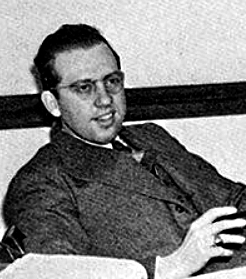
Central Intelligence Chief William j. Casey
CIA Director William Casey thanked "Leo" during 1981 in one of their many exchanges for his "prompt and thoughtful" comments on a considered draft paper related to securing US financial structures against Soviet attack or manipulation. These men would establish a powerful friendship that would noticeably influence United States foreign policy.vi During 1984, Cherne remained on the PFIAB advising Casey on policy to deal with the violent clashes between forces in Salvadoran Civil War. He suggested to Casey that left-wing guerrilla tactics be condemned for "propaganda purposes".vii Cherne according to the New York Times during his service to the administration of George H.W. Bush developed "Team B, a group of experts headed by Richard Pipes, the Harvard historian, which disputed C.I.A. assessments of Soviet military capabilities...the committee's more alarming estimates bolstered the position of the strongest proponents of increased United States military expenditures." He would regularly make contact with intelligence officers in the due course of his various appointments, yet were Cherne's ties with intelligence figures merely the regular course of his official advisory role?
Some would correctly note Cherne's sustained friendly and political interactions do not alone constitute a direct connection or employment with an intelligence group. Nevertheless, a contract summary in the JFK Records Act releases that clears up the matter and presents Cherne's past employment with the Agency. The file dated June 1, 1959 refers to a person using the feasible pseudonym or alias Bruce G. Mastrocola that was a Headquarters support agent. The listed birth date for this person is September 8, 1912 and Leo Cherne was born the same day. "Mastrocola" had superior authority within matters of "government, taxes, foreign trade" and possessed "High-level contacts with the Cuban Government". Leo Cherne frequently visited Cuba for humanitarian and business purposes during the period and possessed high-level contacts. Officials list Mastrocola's employment for a leading a research institute, and he was a member of the International Rescue Committee. Ironically for all the care taken to hide the subject's identity a notation paper clipped to the cover page of the file reads "Leo Cherne".viii
Cherne would advise nine American presidents, befriend multiple CIA directors, and push for huge spending to establish a thriving military industrial complex. His charity work simultaneously aided thousands while providing cover to gather intelligence and promote his Cold War agenda. While Cherne was proud of his praise garnering charity work and the awards from America's highest officials, his desire to oppose Communism using intelligence operations was directly connected to this. As one former high official and friend visiting a declining Cherne in the hospital offered despite his legacy of charity that Leo said, "I hope I'll also be remembered as a cold warrior."
Sincerely,
C.A.A. Savastano
References:
i. Robert Higgs, (November 20 1988), US Military Spending in the Cold War Era: Opportunity Costs, Foreign Crises, and Domestic Constraints, Cato Institute, cato.org
ii. Michael T. Kaufman, (January 14, 1999), Leo Cherne, Leader of Agency for Refugees, Is Dead at 86, New York Times, nytimes.com
iii. Central Intelligence Agency, Library Reading Room, Letter to Mr. Leo Cherne , Executive Director, from Allen W. Dulles, March 31, 1960, cia.gov
iv. Leo Cherne, Refugees' Advocate, Dies at 86, (n.d.), Washington Post, washingtonpost.com
v. CIA, Library Reading Room, Meeting with President's Foreign Intelligence Advisory Board (PFIAB) Chairman Leo Cherne, June 9, 1976, cia.gov
vi. CIA, Library Reading Room, Letter to Leo Cherne from William J. Casey, November 2, 1982, cia.gov
vii. CIA, Library Reading Room, Memo to Leo Cherne from (Sanitized), April 25, 1984, cia.gov viii. National Archives and Records Administration, CIA file, Mastrocola, Bruce G., National Archives and Record Administration Identification Number: 104-10222-10001, archives.gov



